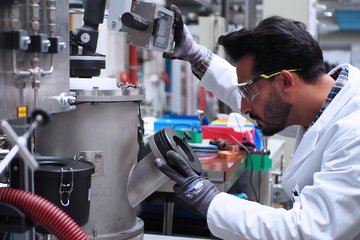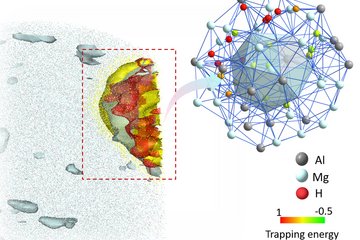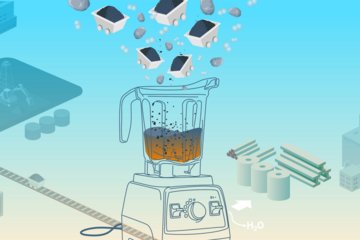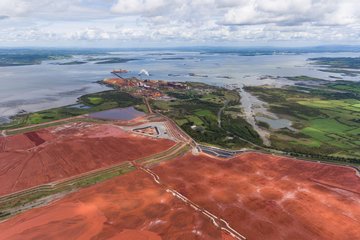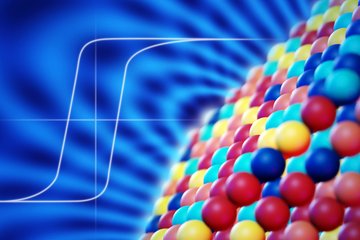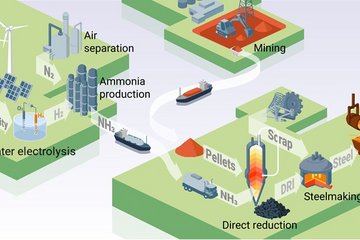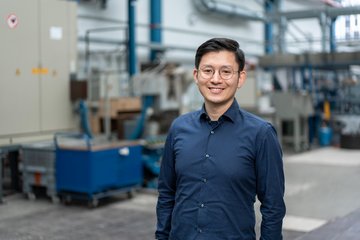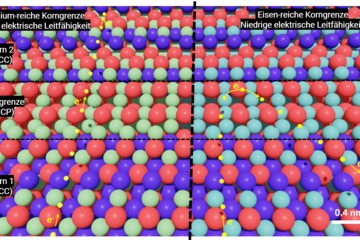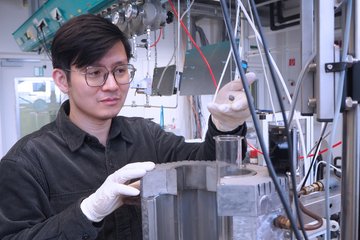Alle Typen
21.
Zeitschriftenartikel
Ab Initio Determined Phase Diagram of Clean and Solvated Muscovite Mica Surfaces. Langmuir 32 (4), S. 1027 - 1033 (2016)
22.
Zeitschriftenartikel
A first principles investigation of zine induced embrittlement at grain boundaries in bcc iron. Acta Materialia 90, S. 69 - 76 (2015)
23.
Zeitschriftenartikel
Connecting semiconductor defect chemistry with electrochemistry: Impact of the electrolyte on the formation and concentration of point defects in ZnO. Surface Science 631, S. 190 - 195 (2015)
24.
Zeitschriftenartikel
Identification of bulk oxide defects in an electrochemical environment. Faraday Discussions 180, S. 97 - 112 (2015)
25.
Zeitschriftenartikel
Negatively charged ions on Mg(0001) surfaces: Appearance and origin of attractive adsorbate-adsorbate interactions. Physical Review Letters 113 (13), 136102 (2014)
26.
Zeitschriftenartikel
Extending the concept of defect chemistry from semiconductor physics to electrochemistry. Physical Review Applied 1 (1), 014001 (2014)
27.
Zeitschriftenartikel
Hydrogen Adsorption on polar ZnO(0001)–Zn: Extending equilibrium surface phase diagrams to kinetically stabilized structures. Physical Review B 82 (16), 165418 (2010)
28.
Zeitschriftenartikel
Temperature Stabilized reconstructions at polar ZnO(0001). Physical Review Letters 103 (6), 065502 (2009)
29.
Zeitschriftenartikel
Nitrogen adsorption and thin surface nitrides on Cu(111) from first-principles. Surface Science 601, S. 4775 - 4785 (2007)
30.
Buchkapitel
Handling Time and Temperature in Materials Simulation. In: Characterization of Materials, 2nd Edition (Hg. Kaufman, E. N.). WILEY (2012)
31.
Meeting Abstract
Impact of the vapour pressure of water on the equilibrium shape of ZnO nanoparticles: An ab-initio study. In APS March Meeting 2014, abstract #Q2.009. APS March Meeting 2014 , Denver, CO, USA, 03. März 2014 - 07. März 2014. (2014)
32.
Meeting Abstract
Impact of the vapour pressure of water on the equilibrium shape of ZnO nanoparticles: An ab-initio study. In DPG Spring Meeting 2014, Abstract: O50.6. DPG Spring Meeting 2014 , Dresden, Germany, 30. März 2014 - 04. April 2015. (2014)
33.
Vortrag
In-situ insights into interfacial processes at reactive liquid-solid interface during magnesium corrosion using cryo-atom probe tomography. EuroMat 2025 conference, Granada, Spain (2025)
34.
Vortrag
New insights into the reactive liquid-solid interface during magnesium corrosion using cryo-atom probe tomography. EUROCORR 2025 Annular Congress of the European Federation of Corrosion, Stavanger, Norway (2025)
35.
Vortrag
Atomic insights into fundamental processes at electrochemical solid/liquid interface by ab initio calculations. 38th Topical Meeting of the International Society of Electrochemistry: Nanomaterials in Electrochemistry, Manchester, UK (2024)
36.
Vortrag
Advancing Electrochemical Insights: Ab Initio Control and Realistic Description of Solid-Liquid Interfaces. 11th International Conference on Multiscale Materials Modeling, Prague, Czech Republic (2024)
37.
Vortrag
Materials design and discovery in high-dimensional chemical and structural configuration spaces. Psi-k 2020 Conference, Lausanne, Switzerland (2024)
38.
Vortrag
Challenges in developing machine learning potentials for fully explicit modeling of solid-liquid electrochemical interfaces. CECAM Workshop "Machine Learning Potentials: From Interfaces to Solution", Ruhr-University-Bochum, Bochum, Germany (2024)
39.
Vortrag
Advancing Electrochemical Insights: Ab Initio Control and Realistic Description of Solid-Liquid Interfaces. 75th ISE Annual Meeting, Montreal, CA, USA (2024)
40.
Vortrag
Insights into stability, reactivity and degradation of electrified solid/liquid interfaces from ab initio calculations. Lorenz Workshop on "Multiscale modeling of electrochemical processes", Leiden, The Netherlands (2024)

